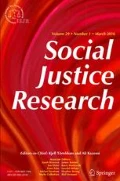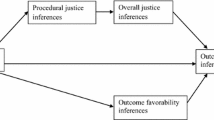Abstract
Various attitutidinal, cognitive, emotional, and actional reactions to problems and needs of less fortunate people (unemployed, poor people in the developing countries, foreign workers in West Germany) were assessed in a questionnaire study with 865 respondents. The external validity of self-report data was established by external ratings. The focus was on emotional reactions (existential guilt, sympathy, moral outrage because of unjust disadvantages, anger about the disadvantaged, contentment with one's own advantages, fear of losing these, hopelessness with respect to the fate of the less fortunate). Several justice-related variables (beliefs, views, appraisals) as well as responsibility-related variables and social attitudes were assessed as predictors of emotions. The importance of justice-related variables for the arousal of different social emotions was clearly shown. The use and usefulness of cognitive models of discrete emotions is discussed. The impact of emotions on the readiness to various forms of prosocial activities in favor of the less fortunate was also shown: Moral outrage and existential guilt proved to be much more salient predictors than sympathy. Crucial differences between these three prosocial emotions as well as the impact of justice-related variables on readiness to prosocial activities are discussed.
Similar content being viewed by others
References
Archer, R. L., Diaz-Loving, R., Gollwitzer, P. M., Davis, M. H., and Foushee, H. C. (1981). The role of dispositional empathy and social evaluation in the empathic mediation of helping.J. Pers. Soc. Psychol., 40: 786–796.
Averill, J. R. (1983). Studies on anger and aggression. Implications for theories of emotion.Am. Psychol., 38: 1145–1160.
Bandura, A., Underwood, B., and Fromson, M. E. (1975). Disinhibition of aggression through diffusion of responsibility and dehumanization.J. Res. Pers., 9: 253–269.
Batson, C. D., and Coke, J. S. (1981). Empathy: A source of altruistic motivation for helping. In Rushton, J. P., and Sorrentino, R. M. (eds.),Altruism and Helping Behavior, Erlbaum, Hillsdale, NJ.
Batson, C. D., Fultz, J., and Schoenrade, P. A. (1987). Distress and empathy: Two qualitatively distinct vicarious emotions with different motivational consequences.J. Pers., 55: 19–39.
Brandtstädte, J. (1985).Emotion, Kognition, Handlung: Konzeptuelle Beziehungen, Urgan and Schwarzenberg, Munich, West Germany.
Dalbert, C., Montada, L., and Schmitt, M. (1987). Glaube an eine gerechte Welt als Motiv: Validierungskorrelate zweier Skalen.Psychol. Beitr. 29: 596–615.
de Rivera, J. (1977). A structural theory of the emotions. (InPsychological Issues Vol. 10). International University Press, New York.
Deutsch, M. (1985).Distributive Justice: A Social Psychological Perspective, Yale University Press, New Haven, CT.
Epstein, S. (1984). Controversial issues in emotion theory. In Shaver, P. (ed.),Review of Personality and Social Psychology, Sage, Beverly Hills, pp. 64–88.
Frijda, N. H. (1987). Emotion, cognitive structure, and action tendency.Cognit. Emot. 1: 115–143.
Hoffman, M. L. (1976). Empathy, role-taking, guilt, and development of altruistic motives. In Lickona, T. (ed.),Moral Development and Behavior, Holt, Rinehart and Winston, New York, pp. 124–143.
Hoffman, M. L. (1982). Development of prosocial motivation: Empathy and guilt. In Eisenberg, N. (ed.),The Development of Prosocial Behavior, Academic Press, New York, pp. 281–313.
Hoffman, M. L. (1987). The contribution of empathy to justice and moral judgement. In Eisenberg, N., and Strayer, J. (eds.),Empathy and Its Development, Cambridge University Press, Cambridge, England, pp. 47–80.
Ickes, W. J., and Kidd, R. F. (1976). An attributional analysis of helping behavior. In Harvey, D. I., Ickes, W. J., and Kidd, R. F. (eds.),New Directions in Attributional Research, Vol. 1, Erlbaum, Hillsdale, NJ, pp. 311–334.
Isen, A. M. (1970). Success, failure, attention, and reaction to others: The warm glow of success.J. Pers. Soc. Psychol. 15: 294–301.
Lazarus, R. S., Averill, J. R., and Opton, E. M. (1970). Towards a cognitive theory of emotion. In Arnold, M. B. (eds.),Feelings and Emotions, Academic Press, New York, pp. 207–232.
Lerner, M. J. (1977). The justice motive: Some hypotheses as to its origins and forms.J. Pers. 40: 1–32.
Lerner, M. J. (1980).The Belief in a Just World: A Fundamental Delusion, Plenum Press, New York.
Lerner, M. J., and Whitehead, L. A. (1980). Verfahrensgerechtigkeit aus der Sicht der Gerechtigkeitsmotiv-Theorie. In Mikula, G. (ed.),Gerechtigkeit und Soziale Interaktion, Huber, Bern, Switzerland, pp. 251–300.
Lifton, V. J. (1967).Death in Life. Survivors of Hiroshima, Random House, New York.
Lück, H. E., and Timaeus, E. (1969). Skalen zur Messung Manifester Angst (MAS) und Sozialer Wünschbarkeit (SDS-E und SDS-CM).Diagnostica 15: 134–141.
Meyer, M. P., and Mulherin, A. (1980). From attribution to helping.J. Pers. Soc. Psychol. 39: 201–210.
Montada, L., and Schneider, A. (1988). Justice and emotional reactions to victims. E. S., Report no. 7. InBerichte aus der Arbeitsgruppe “Verantwortung, Gerechtigkeit, Moral” Nr. 47. Universität Trier, Fb I-Psychologie, Trier, FRG.
Montada, L., and Schneider, A. (1989). Coping mit Problemen sozial schwacher Menschen: Annotierte Ergebnistabellen. E. S., Report no. 9. InBerichte aus der Arbeitsgruppe “Verantwortung, Gerechtigkeit, Moral” Nr. 52.Universität Trier, Fb I-Psychologie, Trier FRG.
Montada, L., Schmitt, M., and Dalbert, C. (1986). Thinking about justice and dealing with one's own privileges. A study of existential guilt. In Bierhoff, H. W., Cohen, R., and Greenberg, J. (eds.),Justice in Social Relations, Plenum Press, New York, pp. 125–143.
Montada, L., Dalbert, C., and Schneider, A. (1989). Coping mit Problemen sozial schwacher Menschen: Ergebnisse der Längsschnittuntersuchung. E. S., Report no. 10. InBerichte aus der Arbeitsgruppe “Verantwortung, Gerechtigkeit, Moral” Nr. 53. Universität Trier, Fb I-Psychologie, Trier, FRG.
Opp, R. E., and Samson, A. Y. (1989). Taxonomy of guilt for combat veterans.Prof. Psychol. 20: 159–165.
Piliavin, J., Rodin, J., and Piliavin, I. (1969). Good samaritanism: An underground phenomen?J. Pers. Soc. Psychol. 13: 289–299.
Roseman, J. (1984). Cognitive determinants of emotions: A structured theory. In Shaver, P. (ed.),Review of Personality and Social Psychology. Emotions, Relationship, and Health, Sage, Beverly Hills, pp. 11–36.
Rosenhan, D. L., Salovey, P., Karylowski, J., and Hargis, K. (1982). Emotion and altruism. In Rushton, J. P., and Sorrentino, R. M. (eds.),Altruism and Helping Behavior, Erlbaum, Hillsdale, NJ, pp. 234–250.
Ryan, W. (1971).Blaming the Victim, Pantheon, New York.
Scherer, K. R. (1984). Emotion as a multicomponent process: A model and some cross-cultural data. In Shaver, P., and Wheeler, L. (eds.),Review of Personality and Social Psychology, Sage, Beverly Hills, pp. 37–63.
Schmitt, M., Dalbert, C., and Montada, L. (1985). Drei Wege zu mehr Konsistenz: Theoriepräzisierung, Korrespondenzbildung und Datenaggregierung.Z. Diff. Diagnos. Psychol. 6: 147–159.
Schneider, A., Montada, L., Reichle, B., and Meissner, A. (1986). Auseinandersetzung mit Privilegunterschieden und existentieller Schuld: Item-und Skalenanalysen I. E. S. Report no. 3. InBerichte aus der Arbeitsgruppe “Verantwortung, Gerechtigkeit, Moral” Nr. 37. Universität Trier, Fb I-Psychologie, Trier, FRG.
Schneider, A., Meissner, A., Montada, L., and Reichle, B. (1987). Validierung von Selbstberichten über Fremdratings. E. S., Report no. 5. InBerichte aus der Arbeitsgruppe “Verantwortung, Gerechtigkeit, Moral” Nr. 41. Universität Trier, Fb I-Psychologie, Trier, FRG.
Schwartz, S. H. (1977). Normative influences on altruism. In Berkowitz, L. (ed.),Advances in Experimental Social Psychology, Vol. 10, Academic Press, New York, pp. 221–279.
Shaver, K. G. (1985).The Attribution of Blame: Causality, Responsibility, and Blameworthiness, Springer, New York.
Smith, C. A., and Ellsworth, P. C. (1985). Patterns of cognitive appraisal in emotion.J. Pers. Soc. Psychol. 48: 813–838.
Solomon, R. C. (1976).The Passions, Anchor, New York.
Sorrentino, R. M. (1982). Derogation of an innocently suffering victim: So who's the “Good Guy”? In Rushton, J. P., and Sorrentino, R. M. (ed.),Altruism and Helping Behavior', Erlbaum, Hillsdale, NJ, pp. 267–286.
Taylor, S. E., Wood, J. V., and Lichtman, R. R. (1983). It could be worse: Selective evaluation as a response to victimization.J. Soc. Issues, 39: 19–40.
Tobey-Klass, E. (1978). Psychological effects of immoral actions: The experimental evidence.Psychol. Bull. 85: 756–771.
Wills, T. A. (1981). Downward comparison principles in social psychology.Psychol. Bull. 90: 245–271.
Author information
Authors and Affiliations
Rights and permissions
About this article
Cite this article
Montada, L., Schneider, A. Justice and emotional reactions to the disadvantaged. Soc Just Res 3, 313–344 (1989). https://doi.org/10.1007/BF01048081
Issue Date:
DOI: https://doi.org/10.1007/BF01048081




